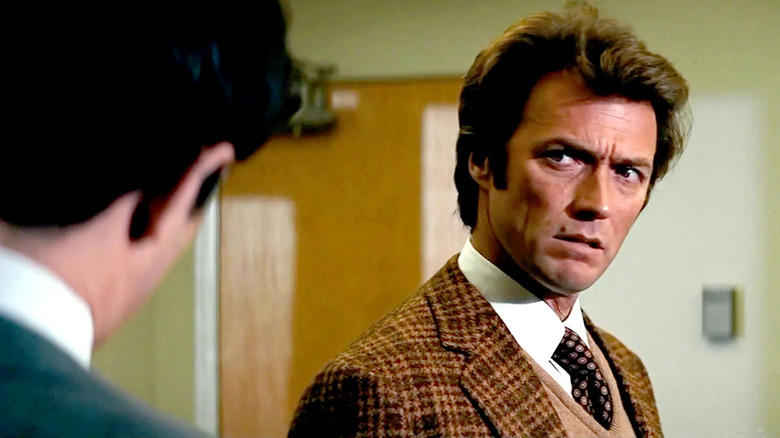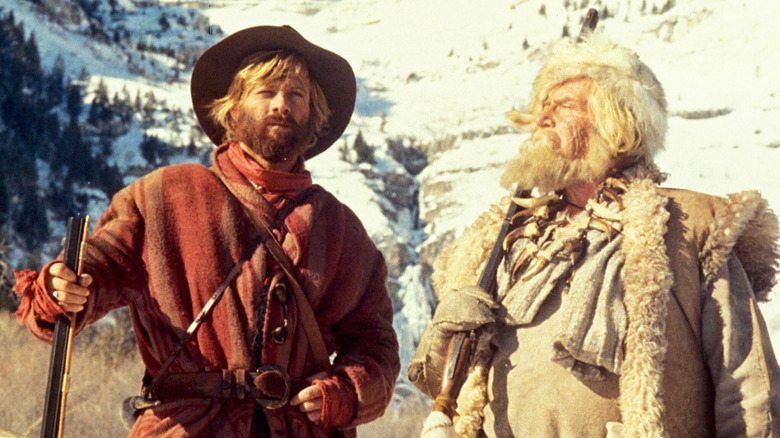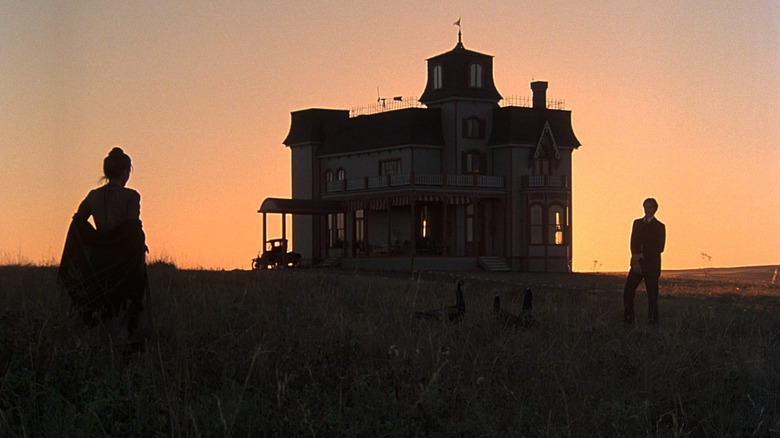Terrence Malick Is One Of The Unsung Heroes Behind Clint Eastwood's Dirty Harry Role
A modern audience member cannot watch Don Siegel's 1971 cop drama "Dirty Harry" without first being made aware of its politics. The landmark Supreme Court case Miranda v. Arizona had been decided five years earlier, granting certain rights to people in police custody. While the measure protected people from being unduly coerced into confessions by the cops — they had the right to remain silent, and to have an attorney present prior to police questioning — many at the time objected to Miranda rights, arguing that cops now had less recourse to apprehend and imprison suspects.
This criticism plays itself out in "Dirty Harry" wherein Clint Eastwood plays the titular cop, SFPD's Inspector Harry Callahan, a man known for playing dirty, but also for always "getting his man." Miranda is what eventually stands in the way of Harry capturing a Zodiac Killer-like criminal called Scorpio (Andrew Robinson), who is frequently heard complaining about his rights.
Harry exemplified a certain type of old-world, rough-'em-up police machismo that had become a trademark of the genre. Cops, many films seemed to argue, should be allowed to be loose cannons and bend rules in order to apprehend a suspect, no questions asked. Harry himself, wearing ugly '70s suits and armed with a .44 magnum, imprinted himself into the audience's mass consciousness, becoming an archetype of all grizzled cops to come after.
"Dirty Harry" is credited to three screenwriters, Harry Julian Fink, R.M. Fink, and Dean Riesner. However, in a 2010 interview with IGN, filmmaker John Milius once claimed that the final draft of "Dirty Harry" was written mostly by him, a claim he elucidated on in a 2015 with Creative Screenwriting. He never received credit nor, he says, did one of the true architects of Harry Callahan: legendary filmmaker Terrence Malick.
Milius' milieu
Milius has been a Hollywood screenwriting institution — and a refreshingly gruff one — since the start of his feature film career in the late 1960s. According to the Creative Screenwriting article, he was once called the hottest writer in Hollywood, and sold his script for "The Life and Times of Judge Roy Bean" for a then-unprecedented $300,000. Milius has screenwriting credits on such classics as "Jeremiah Johnson" (the film behind the smiling, bearded Robert Redford .gif) and "Apocalypse Now," and he stepped into the director's chair for "Big Wednesday," "Red Dawn," and "Conan the Barbarian." Milius has always been very open about the ups and downs of working in Hollywood, claiming in the interview book "Big Bad John" that he lost a lot of work for, in his words, "not being obedient."
When Creative Screenwriting asked Milius what it was he brought to the "Dirty Harry" screenplay, Milius was quick to say that he brought "the whole thing." He talked about how he merely didn't pursue legal action with the Writers Guild at the time merely because he didn't have the knowhow or the wherewithal to do so. He also says that he should have. In his words:
"I should have gotten the full credit. That's another one of my great Writers Guild complaints — I didn't send in my letter for the arbitration. I didn't even know in those days that if you didn't consent to the agreed credits that you should send in something. And that's why I didn't get credit. "I was off making Judge Roy Bean.' Clint always asked me, 'Do you want to take your name off?' That's what he always thought."
Then Milius casually dropped the bomb: "You know who else did a draft after me and probably should have gotten credit? Terry Malick."
Wait, what?
Feeling placid, punk?
Terry Malick? As in Terrence Malick? As in the filmmaker behind the 1973's "Badlands" and 1978's "Days of Heaven?" As in the man who famously took a 20-year hiatus from filmmaking, only to return in 1998 with a series of dreamy, contemplative films about the futility of war ("The Thin Red Line"), the textures of living emotionally ("The Tree of Life"), the importance of faith ("To the Wonder"), and the fundamentally vital philosophies of pacifism ("A Hidden Life")? That Terrence Malick?
Yes, evidently when Malick was on the rise in the early '70s, he contributed to several notable screenplays, often under the penname David Whitney or Lingard Jervey, including "Dirty Harry." At least according to Milius. If this is not true, it's certainly an odd claim. Malick's own métier couldn't be further from "Dirty Harry," a piece of conservative agitprop about the importance of violence. Malick, even in his early works, touted beauty, peace, and the difficulties of living by one's principles. He would go on to make films which were explicitly about how war and violence were mankind's greatest failings, and how a true Christian life involves adopting an active role in the rejection of war.
If Milius is to be trusted, Malick wrote a draft of "Dirty Harry," and should have been credited.
Given the labyrinthine contracts that go into most Hollywood productions, and the way screenplays tend to pass through many, many hands on their way to the screen, it's hard to say how much of the final version of "Dirty Harry" was made my Milius, how much was by its three credited screenwriters, and how much was Malick's.
It's completely bizarre to think that any of it is Malick's at all.


